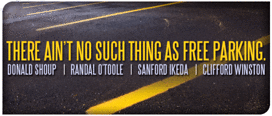While I do largely agree with Professor Shoup’s proposals, and I’m pleased that he seems to like my case for fuller privatization, I did list six points on which, to a greater or lesser degree, I take issue with him. Unfortunately, Professor Shoup evidently thinks them not worth addressing. Does he really believe, to take one of those points, that zero-price curbside parking is “the most disastrous experiment ever in social engineering”?
But that kind of hyperbole seems to match Randal O’Toole’s over-the-top response, which I think Professor Manville neatly summarizes as “ ‘mobility’ must mean automobility” and that there seems to be no difference to him “between placing limits on mobility and removing subsidies for it” (all emphases in original).
As an economist I’m neither for nor against the car, nor for nor against urban sprawl (we’ve always had it), nor for nor against zero-price parking. What I am for is the market discovery process, and what I’m against is government piling intervention on intervention when a property-rights solution is possible. Moreover, I’m against government policies that subsidize the car, that promote low-density development (and that doesn’t mean I’m somehow a stealth New Urbanist/Smart Growther); and I’m against government control of privatizable property that prevents the emergence of market prices. I’m for freedom of choice, and that requires the fullest extension of tradable private-property rights.
Both Professors Shoup and O’Toole seem to think they know what the “free-market solution” will be: for the former it’s expenditure on sidewalk repair and for the latter it’s more spending on parking. My position is that the market is radically creative and so, absent perfect knowledge, it’s pretentious to think we know how a free people would use their wealth.
Clifford Winston, whom I first came to know for his excellent work on airline deregulation, does raise a legitimate concern that privatizing curbside parking could result in market power. Given locational monopoly, a well-placed neighborhood might be in a position to charge monopoly rents. Two responses.
First, such a neighborhood would still face competition from similarly situated neighborhoods, which might constrain, though perhaps not remove, market power. More importantly, however, over time, if there are substantial rents, well, that’s when we could very well see the re-emergence of things like off-street parking (sans regulatory parking minimums) or even market-based forms of mass transit that eliminate the need for parking, such as buses and jitneys, which I discuss in my comment, or even light rail.
(I hasten to add that this doesn’t mean I favor government investment in those things! I’m all for mobility if that’s what a free people demand, but I won’t presume to know what form it will take.)
Second, market power may not be so bad compared to the status quo. Those monopoly rents already exist even with zero-price curbside parking don’t they? The rent collectors are the lucky motorists who get a parking space; the losers are those who would gladly have paid even super-competitive prices to park, but can’t because there’s no market. So the relevant question is: How do the spaces get allocated—on the basis of random chance or willingness to pay?
I submit that willingness to pay, even in the presence of locational monopoly, is preferable from an economic point of view to the marketless status quo.

